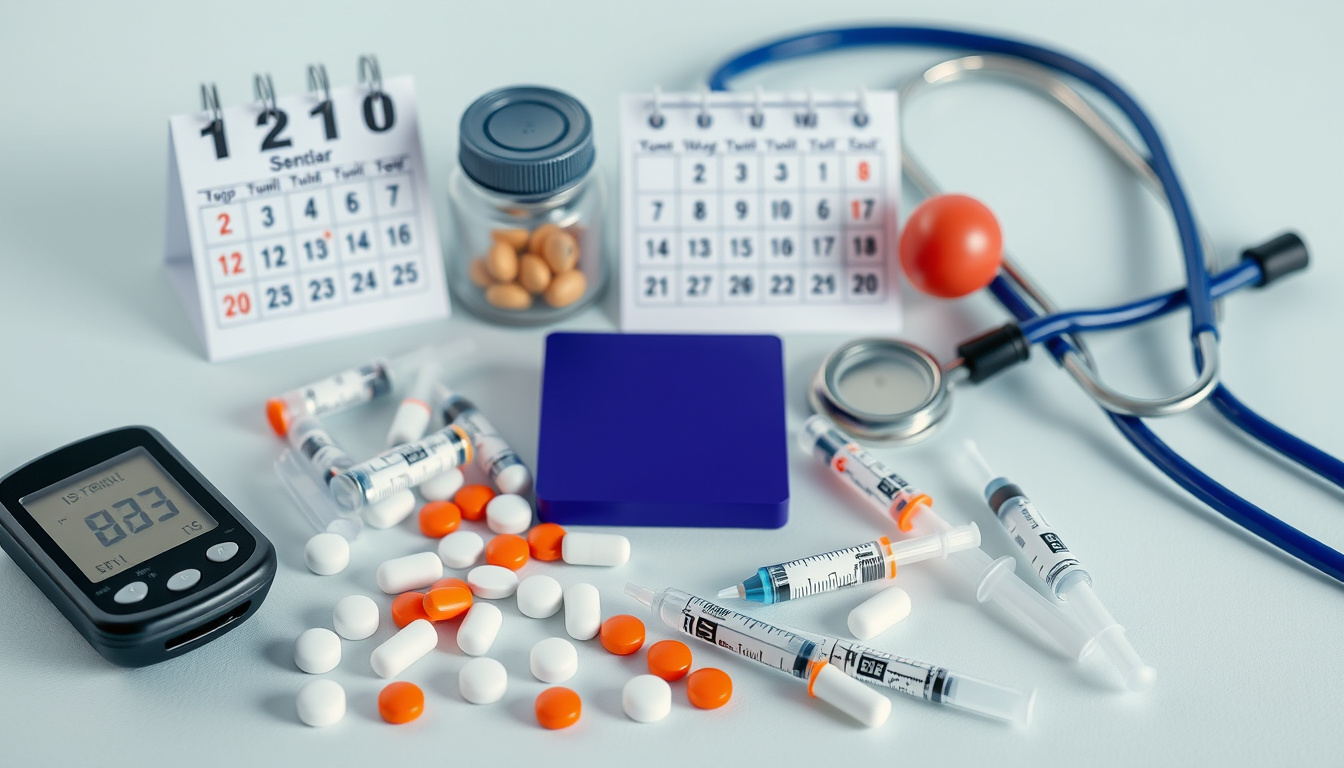Mastering Your Health: Effective Strategies on How to Control Type 2 Diabetes
 Jill Smith
Jill SmithType 2 diabetes is a chronic condition that affects millions of people worldwide.
With the right strategies, however, individuals can learn how to control type 2 diabetes effectively and lead a healthier life.
This article delves into the essential components of managing this condition, covering everything from understanding its causes to building a supportive community.
Whether you're newly diagnosed or seeking to improve your existing management plan, these insights will empower you to take charge of your health.

Key Takeaways
- Understanding the causes and risk factors of Type 2 diabetes is crucial for effective management.
- A balanced diet plays a vital role in controlling blood sugar levels and maintaining overall health.
- Regular physical activity is essential for managing Type 2 diabetes and can significantly improve glucose control.
- Consistent monitoring of blood sugar levels is key to tracking progress and making necessary adjustments.
- Building a strong support system enhances motivation and provides valuable resources for managing diabetes.
Understanding Type 2 Diabetes: Causes and Risk Factors
Understanding Type 2 Diabetes: Causes and Risk Factors Type 2 diabetes is a chronic condition that affects how your body metabolizes sugar (glucose), a vital source of fuel for your body.
To effectively learn how to control type 2 diabetes, one must first grasp its underlying causes and risk factors.
Insulin resistance, where the body's cells become less responsive to insulin, is a primary contributor to this condition.
Factors such as obesity, lack of physical activity, and an unhealthy diet play crucial roles in its development.
Genetics also come into play, as having a family history of diabetes can increase your risk.
Additionally, other conditions like high blood pressure and elevated cholesterol levels can amplify your likelihood of developing type 2 diabetes.
Understanding these causes and risk factors is essential for anyone looking to manage and control type 2 diabetes effectively, empowering them with knowledge to make healthier lifestyle choices.
The Role of Diet in Managing Blood Sugar Levels
Managing blood sugar levels is crucial for individuals dealing with type 2 diabetes, and diet plays a pivotal role in this process.
Understanding how to control type 2 diabetes begins with selecting the right foods that not only satisfy hunger but also stabilize blood sugar levels.
Incorporating whole grains, lean proteins, healthy fats, and a variety of vegetables can lead to significant improvements in overall health and glucose management.
Portion control is equally important; smaller, more frequent meals can help maintain steady insulin levels.
Additionally, reducing the intake of refined carbohydrates and added sugars is essential.
By making informed dietary choices and focusing on balanced nutrition, those living with type 2 diabetes can take significant strides toward controlling their condition effectively.
'The greatest wealth is health.' - Virgil

Physical Activity: Exercise as a Tool for Diabetes Control
Physical activity is a powerful tool for managing and controlling type 2 diabetes effectively.
Engaging in regular exercise not only aids in weight management but also enhances insulin sensitivity, allowing the body to utilize glucose more effectively.
For individuals looking to understand how to control type 2 diabetes, incorporating a combination of aerobic exercises, such as brisk walking, cycling, or swimming, along with strength training, can be particularly beneficial.
Aim for at least 150 minutes of moderate-intensity aerobic exercise per week, complemented by muscle-strengthening activities on two or more days.
Consistency is key; developing a routine that fits into your lifestyle can lead to substantial improvements in blood sugar levels, overall health, and well-being.
Additionally, physical activity helps reduce the risk of cardiovascular complications associated with diabetes.
By making exercise a regular part of your life, you are taking significant steps towards effective diabetes management.
Monitoring Blood Sugar: Essential Practices for Success
Monitoring blood sugar is crucial for anyone looking to manage or understand how to control type 2 diabetes effectively.
Regularly checking your blood sugar levels allows you to gain insights into your body's response to food, exercise, and medication.
Keeping a detailed record of your readings can help you identify patterns and triggers that affect your glucose levels, enabling you to make informed decisions about your lifestyle choices.
It’s beneficial to monitor blood sugar at different times of the day, particularly before and after meals, to get a comprehensive understanding of how your diet impacts your diabetes management.
Moreover, lifestyle modifications such as maintaining a balanced diet rich in whole foods, engaging in regular physical activity, and adhering to prescribed medications are essential practices that, when combined with vigilant monitoring, can significantly contribute to successfully managing type 2 diabetes.

Medication Management: When and How to Use Diabetes Medication
Medication management plays a vital role in how to control type 2 diabetes, particularly when lifestyle changes alone aren’t enough to maintain optimal blood sugar levels.
Understanding when and how to use diabetes medication is crucial for effective disease management.
Typically, healthcare providers will recommend medication alongside diet modifications and exercise to help control blood glucose levels.
Medications such as Metformin often serve as first-line treatments, improving insulin sensitivity and reducing glucose production in the liver.
It's essential to work closely with your healthcare provider to tailor a medication plan that fits your specific needs, as this can include oral medications, injectables, or insulin therapy.
Regular monitoring of blood sugar levels can guide adjustments to your treatment plan, ensuring you find the best approach to control your diabetes effectively.
Furthermore, alongside medication, incorporating a nutritious diet and regular physical activity can enhance your ability to manage this condition.
Building a Support System: The Importance of Community and Resources
Managing type 2 diabetes effectively goes beyond just medication and dietary choices; it requires a strong support system that can help motivate and guide individuals on their journey.
Building a support system involves engaging with a community of like-minded individuals, healthcare professionals, and resources that provide valuable information on how to control type 2 diabetes.
Connecting with local diabetes support groups or online forums can foster motivation and create a sense of belonging, as members share their experiences and strategies for managing their condition.
Additionally, healthcare providers can offer personalized advice and educational resources, ensuring that individuals are well-equipped to make informed decisions about their health.
Incorporating regular check-ins with a dietitian or nutritionist can further enhance this support system by providing tailored meal plans and insight into maintaining a balanced diet.
Ultimately, leveraging community support and available resources is crucial for those learning how to control type 2 diabetes, making the journey not only manageable but also empowering.
Frequently Asked Questions
What is Type 2 diabetes and what are its main causes?
Type 2 diabetes is a chronic condition that affects the way your body metabolizes sugar (glucose).
It is primarily caused by insulin resistance, where your body's cells stop responding properly to insulin, and can also involve issues with insulin production.
Risk factors include obesity, physical inactivity, family history, and age.
How can diet help in controlling Type 2 diabetes?
Diet plays a crucial role in managing blood sugar levels in Type 2 diabetes.
Consuming a balanced diet rich in whole grains, fruits, vegetables, lean proteins, and healthy fats can help maintain stable blood sugar levels.
It’s important to monitor carbohydrate intake and choose low-glycemic foods that have a minimal impact on blood sugar.
What types of physical activity are best for diabetes control?
Regular physical activity is essential for Type 2 diabetes management.
Aerobic activities such as walking, swimming, or cycling, performed for at least 150 minutes per week, can improve insulin sensitivity.
Strength training exercises, done at least twice a week, can also assist in managing blood sugar and promoting overall health.
How can I monitor my blood sugar levels effectively?
Effective blood sugar monitoring involves using a glucometer to check your levels regularly, as recommended by your healthcare provider.
Keeping a log of your readings can help identify patterns and triggers, and it’s vital to aim for target ranges as specified by your healthcare team.
When should I consider medication for Type 2 diabetes?
Medication may be needed when lifestyle changes alone are insufficient to control blood sugar levels.
Consult your healthcare provider to determine the appropriate time to start medication, which may include oral antidiabetics or insulin therapy, depending on your individual circumstances.
Turn Back the Clock: Unlock the Secrets to Reverse Diabetes in 30 Days. Don't Wait! Download Now
Subscribe to my newsletter
Read articles from Jill Smith directly inside your inbox. Subscribe to the newsletter, and don't miss out.
Written by
